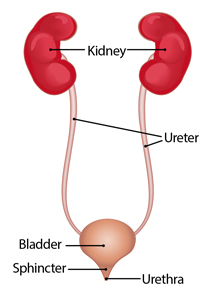Understanding Urology
 Urology is the branch of medicine concerned with the function and diseases of the male and female urinary tract and the male reproductive organs. A urologist is a physician who is trained to evaluate the genitourinary tract, which includes the kidneys, urinary bladder and genital structures in men and women, and the prostate and testicles in men.
Urology is the branch of medicine concerned with the function and diseases of the male and female urinary tract and the male reproductive organs. A urologist is a physician who is trained to evaluate the genitourinary tract, which includes the kidneys, urinary bladder and genital structures in men and women, and the prostate and testicles in men.
The urinary system includes two kidneys, two ureters, the bladder, two sphincter muscles and the urethra. Your body takes nutrients from food and uses them to maintain all bodily functions, including energy and self-repair. After your body has taken what it needs from the food, waste products are left behind in the blood and in the bowel. Your organs, tubes, muscles and nerves work together to create, store and carry urine in order to keep the chemicals and water in your body balanced.
What Causes Problems in the Urinary Tract?
 Problems in the urinary system can be caused by aging, illness or injury. As you get older, changes in the kidneys' structure cause them to lose some of their ability to remove wastes from the blood. Also, the muscles in your ureters, bladder and urethra tend to lose some of their strength. You may have more urinary infections because the bladder muscles do not tighten enough to empty your bladder completely. A decrease in strength of muscles of the sphincters and the pelvis can also cause incontinence, the unwanted leakage of urine. Illness or injury can also prevent the kidneys from filtering the blood completely or block the passage of urine.
Problems in the urinary system can be caused by aging, illness or injury. As you get older, changes in the kidneys' structure cause them to lose some of their ability to remove wastes from the blood. Also, the muscles in your ureters, bladder and urethra tend to lose some of their strength. You may have more urinary infections because the bladder muscles do not tighten enough to empty your bladder completely. A decrease in strength of muscles of the sphincters and the pelvis can also cause incontinence, the unwanted leakage of urine. Illness or injury can also prevent the kidneys from filtering the blood completely or block the passage of urine.
